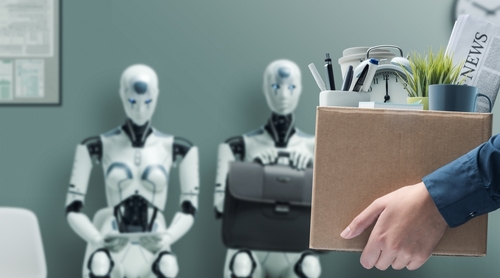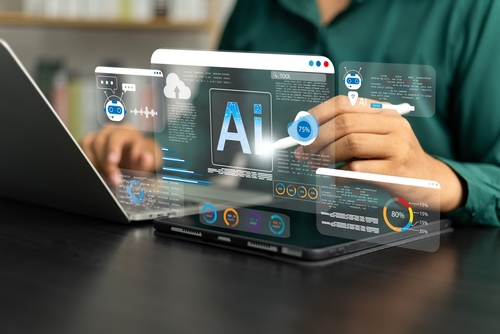AI enhanced not robot replaced: The impact of AI voice-bots on debt collection
4D Contact, Global Debt Recovery and Credit Management ServicesWritten by Mark Smith
Read it in 5 minutes
 1200
627
1200
627
Written by Mark Smith
Read it in 5 minutes
Mark Smith
Written by Director of International Debt Recovery & Credit-Control provider 4D Contact, Mark is an invoice-to-cash process expert. He specialises in working in partnership with his clients to build and deliver bespoke solutions which secure cash targets and their customers an outstanding experience.
12 September 2024
Like the agricultural, industrial and digital revolutions that have come before it – there is little doubt that AI will fundamentally change the way people work. However, how it will change and what it will mean for the working population, is still to be understood. On one hand there is an apocalyptic vision of man replaced by robot and of working people once again marginalised by those in power. On the other there is growing momentum behind the concept that work will be enhanced by AI. In this article we take a look at how as AI voice-bots are deployed within the debt collection industry, the impact they are having on employee productivity and satisfaction.

History has shown us how science and technology advances drive socio-economic change in which there are winners and losers. The land-owning classes won in the agricultural revolution, whilst the feudal farmers suffered. The industrial revolution led to the rise of the middle-classes – at the cost of the working class. However, the digital revolution delivered a different result. The typing pool of the past may have become redundant but new, more interesting job opportunities were created and, freed from the constraints of a class driven society, anyone could take advantage of them. Perhaps highlighting some hope for the AI revolution.
There is no question that AI can free employees from repetitive and mundane tasks. The issue is what will they do with their free time? For businesses looking to increase productivity and growth, rather than simply improve profits, the emphasis is on enabling people to utilise their uniquely human talents such as creativity, social and interpersonal skills.

It was this objective that made 4D Contact, a global debt recovery and outsourced credit-control provider, look at integrating specialist AI voice-bots into their service offering. Traditionally offering human voice-led collections services, 4D Contact were looking for a solution which would provide a top the funnel triage to their voice-call process. They wanted to remove the simple repetitive tasks from their agents’ diaries such as providing payment reminders, sending payment links or support documentation. And enable them to focus on the areas where they can really add value such as resolving complex queries or supporting customers who are struggling to pay. Ashley Barratt, company director and head of AI deployment at 4D Contact stated;
“This triage provided by the AI voice-bots will enable 4D Contact to handle a greater number of accounts with our existing headcount – they essentially boost the productivity of our human team and enable business growth. As we offer an employee profit share program, improved productivity and business growth equates to greater financial rewards for our human workforce”.
With an identified correlation between the age of a population and how productive it is, AI is believed to potentially have key role to play in helping developed economies overcome the challenges of an ageing population. A recent report from Barclay Research group and IBM Institute for Business Value on how recent breakthroughs in Artificial Intelligence could provide a boost to productivity highlighted;
“For developed economies, the implications of an AI-led boom would be significant. Put simply, economic growth can be driven by how much labour you put in and/or how productive it is. If economies can get more out of their pools of labour, raising output-per-hour-worked, they can offset a loss of capacity due to ageing”
AI revolution: productivity boom and beyond, Barclay Research group and IBM Institute for Business Value
Despite potential gains, it would be naïve to suggest that there will not be a negative impact on some individuals. Historical evidence from all the previous socio-economic revolutions suggests change comes at cost. Lower paid jobs are most at risk, and these workers will need new skills if they are to transition to better paid, newly created positions. As the McKinsey Global Institute Report A new future of work: The race to deploy AI and raise skills in Europe and beyond states “there is a risk of a more polarized labor market, with more higher-wage jobs than workers and too many workers for existing lower-wage jobs”.
There are already real examples of AI replacing humans in job roles – with repetitive administrative tasks particularly susceptible to automation. However, there are also examples, including 4D Contact, of AI delivering on the promise of increased efficiency and innovation. As Ashley Barratt stated “we are keen to share our story as it provides an alternative perspective to the doom and gloom – and maybe offers some hope. The AI voice-bots will not only improve the productivity of our existing workforce, but also enable us to develop new services which would simply not be financially viable using a solely human team”.
Whilst historically regulation was delivered post prior revolutions, it is widely agreed the regulation is needed now. Initiatives such as the AI Alliance, a global network of technology firms, universities, non-profits and government groups are already working together to “responsibly maximise benefits to people and society everywhere”. AI and its impact on the working world of the future must be on all governments and businesses agendas to ensure we are ready to exploit its advantages and mitigate the human risk.